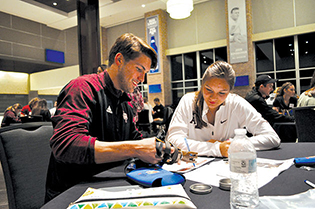A&M Athletes Build Prosthetic Hands as Part of 'Helping Hands' Initiative (TX UCEDD)
April 7, 2017

|
A group of 54 A&M student athletes teamed up Wednesday night in Kyle Field - not to play sports, but to build prosthetic hands for people in third-world countries.
The athletes worked in teams to build 18 prosthetic hands for global distribution to people in third world countries who are missing limbs. With 45 minutes on the clock, the athletes, divided into groups of three, collaborated to reach the common goal of successfully building one hand per group.
The activity was a part of Helping Hands, a service-oriented educational initiative used widely in the corporate arena and has slowly permeated onto university campuses. The initiative is the brainchild of Cynthia Cantu, event facilitator and Class of 1996, and Mike Beyerlein, professor in the Human Resource Development Graduate Program.
"The event is a combination of two major purposes. One is a charitable purpose. We're making prosthetic arms that are kind of part of a team-building session as well," Cantu said. "The groups have to work together and overcome some hurdles as they practice certain skills to assemble these prosthetic arms."Team-building skills and empathy were among the main learning objectives of Wednesday night, Beyerlein said.
"Who taught you how to be effective in team projects? Nobody," Beyerlein said. "It's like we're missing something, so we're trying to find ways to fill that gap and if we can do it well here then maybe we can spread that and help other schools."
The materials used to assemble the prosthetic arms were purchased from non-profit companies with the support of sponsors. The prosthetics built are a low-cost alternative for typical medical grade prosthetic hands, generally costing around $3,000 per unit.
"I think it's great for people who don't have the means and the finances to be able to purchase the high-end prosthetic arms," said Jaevin Reed, business freshman and women's track and field athlete. "I think this is a great opportunity for them to still be able to have the same things."
Cantu developed and incorporated her own learning initiative, "ETCH XP," into the program to motivate learners to build a deep connection to the topic and give encouragement.
"Cynthia's language for this and her ideas from industry were a little different from mine, but we found that they fit together," Beyerlein said. "In both cases, our goal is enable the students to be more prepared to succeed with the kinds of things that curriculum doesn't usually address."
After completion, the prosthetics are prepped for global distribution, reaching around 70 countries in the past, according to Cantu. In addition to the long-term impact of this event, a selection of student athletes will participate in a service project to Haiti in May in which they will hand-deliver 25 hands produced on the A&M campus to recipients in Haiti.
Give a Hand, a non-profit organization, says that in the 10-year history of the project, no group traveling to Haiti has ever requested to personally deliver the prosthetics to their recipients. Aggies will be the first during next summer's student athlete service project in Haiti.
"I function with two hands everyday and I really take it for granted," said Christian Robertson, international studies senior and football player. "I can't imagine what it would be like to lose my hands, and knowing that this may go help someone - regardless of it's in a different country or within the United States - I don't really care where it goes, as long as it's helping someone, that's pretty cool to know."
A&M athletes build prosthetics
https://www.youtube.com/watch?v=BNPBMtIfYP8







